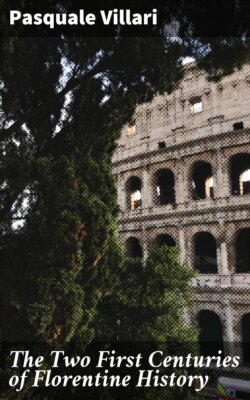Читать книгу The Two First Centuries of Florentine History - Pasquale Villari - Страница 22
На сайте Литреса книга снята с продажи.
X.
ОглавлениеTable of Contents
Thus the Florentine Commune resembled a confederation of Trade Guilds and Societies of the Towers. Its directing authorities for affairs of war, finance, justice, and other matters of the highest importance, were the Consuls, elected yearly, with a senate or council of about a hundred worthies, likewise elected yearly, and lastly a parliament. The Consuls were almost invariably chosen from members of the Companies of the Towers, and if, for any reason, no election of Consuls took place, the rectors of the Towers or of the guilds were provisionally empowered to act in their stead. But the guilds predominated in the Council, and as a natural consequence the government assumed a popular character from that time, and the whole policy of Florence always tended to promote the trade and commerce of the city.
Nevertheless, to obtain a still clearer idea of a government of this kind, it would be requisite to ascertain exactly who and what were the citizens entitled to a share in it, and this point is still somewhat doubtful. The outlying territory (contado) was entirely excluded from citizenship, nor was this privilege granted to all dwellers within the walls, the lower class of artisans and the populace being excluded from it.142 Hence the government was concentrated in the hands of a few powerful families, the heads of the guilds, and their principal adherents. In fact, even down to the last days of the Republic real citizenship—the possessors of which alone were eligible to political posts—was a privilege conceded to few, and even in 1494 the number of citizens scarcely exceeded three thousand. For this reason, even at the present day, we may find a few humble families asserting their inheritance of old Florentine civic rights, as a rare privilege and almost as a title of nobility. At Venice, even in the eighteenth century, to the last days of the Republic there still existed different grades of citizenship, and the right of government was restricted to a small caste. This is one of the points in our history demanding closer investigation. It is true that the whole people met indistinctly in parliament; but such assemblies were mostly of a purely formal kind. For, seeing that the parliament was convoked either in some square, often of small extent, or inside a church, we are bound to infer that the privilege accorded to all the inhabitants of the city was nominal rather than real.
It were likewise superfluous to add that the exact division of power, as in modern constitutions, was entirely ignored in those days. Affairs were divided according to their importance and the quality of the individuals concerned in them, rather than according to their nature. The Council of the Hundred was not, as might be supposed, at this day, a legislative assembly, nor was the executive power vested in the Consuls. The latter gave judgment, administered affairs, commanded armies, executed the will of the people, and occasionally completed legislative acts even without the aid of the Council. This, however, was always consulted regarding very important reforms, but often voted for or against them without any discussion. On questions of extraordinary moment the parliament gave its placet without always understanding the nature of the question. On the other hand, not only affairs of some gravity, and particularly those for which money was needed, were referred to the Council; but this could also be consulted, at the Consul's pleasure, on any question whatever, from the proposed execution of some political offender to granting some citizen permission to transfer his abode from one sestiere to another.143 Although a question of the latter kind seems very insignificant to us nowadays, it was an important one then, since it altered the distribution of the inhabitants in different parts of the city, and consequently the relative strength of these parts and the proportional right of the citizens to fill public offices—a point that was very jealously watched.
BELFRY OF S. ANDREA, MERCATO VECCHIO, FLORENCE.
[To face page 130.
Such was the first form of government adopted by the Florentine Commune. But the Commune was not yet consolidated nor sufficiently sure of its strength. The territory beneath its sway was very limited in extent, with ill-defined, disputable and disputed frontiers. Even within these borders the Commune had very little power, inasmuch as the castled nobility not only vaunted their independence of the city, refusing to acknowledge any authority save that of the Empire, to which they were not always submissive, but waged constant war on the Commune, and perpetually incited neighbouring lands to rebellion. Accordingly, the first thing to be done at this juncture was to seize the contado by force of arms, reduce it to subjection and govern it, the which, as we shall see, led to many new and serious complications, both within and without the walls. These vicissitudes constitute the real civil history of Florence, which finally starts from this moment.
